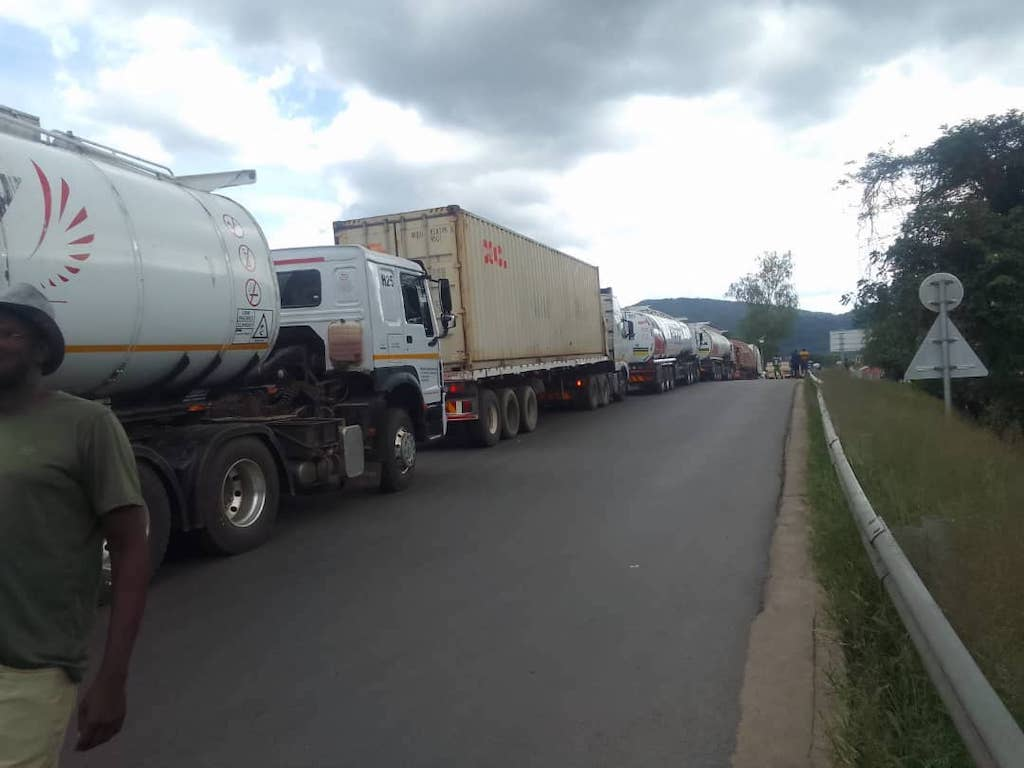
A CONVOY of haulage trucks laden with cargo snakes for about 2km on the road along the Zimbabwe-Mozambique border in the eastern city of Mutare, waiting to cross into the neighbouring country on a hot Saturday morning.
To a casual observer, this is a sign that due process is being followed. Not so, when you dig deep into the underworld of smuggling.
Oxpeckers went looking for lithium, one of the minerals considered critical for both the energy and transport sectors as it is a key component in the production of electric vehicles and in lithium-ion batteries for energy storage.
Zimbabwe has Africa’s largest lithium reserves and is ranked one of the top 10 countries in the world producing the soft, silvery-white ore.
The country has the leading lithium production growth in southern Africa, surging from 2% to 10% of global supply since 2022.
The government banned the export of raw, unprocessed lithium in 2022, arguing that the country gets more revenue from the mineral if companies are allowed to export only processed lithium.
The ban was also meant to reduce the smuggling of the mineral.
Lithium contraband
- Mavhunga puts DeMbare into Chibuku quarterfinals
- Bulls to charge into Zimbabwe gold stocks
- Ndiraya concerned as goals dry up
- Letters: How solar power is transforming African farms
Keep Reading
While most of the lithium is mined by big companies like Sinomine, among others, some of it is in the hands of artisanal and small-scale miners (ASMs), both registered and unregistered, who smuggle it across the border for high prices, according to a source active in the chain.
Lithium contraband also includes ore stolen from the big mines and hidden among other exports.
Alerted to 2024 data collated by private business intelligence company CRU Group showing that an untraceable amount of raw lithium is being exported from South Africa to China, Oxpeckers journalist Tatenda Chitagu went undercover, to show how extra lithium from the region’s largest producer is being smuggled to South Africa.
He uncovered just how easy it is to facilitate the smuggling of lithium out of Zimbabwe.
At the Machipanda Border Post, a major economic link between Zimbabwean capital Harare and Mozambican port city Beira, young men and women offered to help to facilitate the smuggling of goods on a truck.
They are commonly referred to as Majori-jori (smuggling facilitators).
They serve as fronts for border employees, soldiers and policemen, who seek bribes in order to ensure goods can pass through the border without paying duty or being declared.
Three extremely confident young men introduced the Oxpeckers team to a post for soldiers and police, where they assured us all would go smoothly before asking for money for drinks.
Investigations show when the lithium crosses into Mozambique, the mineral is sold to Chinese buyers offering lucrative prices who ship it to Beijing via the Beira port.
“There is a ready and lucrative market in Mozambique as compared to Zimbabwe and there are many Chinese buyers there,” one of the smuggling facilitators said.
Beitbridge
About 550km south lies Zimbabwe's Beitbridge Border Post leading to South Africa, Sadc’s busiest inland port of entry.
The post is modern with the latest security infrastructure and cargo on haulage trucks is scanned at a weigh bridge before crossing.
On the surface, it appeared as if the border has been sealed and nothing could cross without following due process.
But the hordes of people who mill around at the border entrance will tell you anything can be smuggled if you have the right “middleman”.
Asked if it was possible to smuggle lithium across the border into South Africa, a clearing agent responded: “It depends on the quantity of your lithium. We do all the deals here at the official entry.
“We need to know the security details [personnel] on duty during the day and then pay them before they go to work at night. We also need to pay the immigration officials on duty on the day you want your stuff to cross.”
Two hours of observing the movement of trucks at the weigh and scanning bridge showed that in some instances, the security agents carried out cursory “window dressing” checks on some trucks and literally turned a blind eye to them, while in others, they did a thorough job — sometimes ordering the removal of canvas covering the cargo.
South Africa
A battery market analyst at the CRU Group, Cameron Hughes, told Oxpeckers that they have noted a spike in exports of lithium from South Africa in September 2024, during which about 147 000 tonnes of ore was shipped to China and would have contained about 2% to 2,5% of lithium.
“We are still unclear where all of this came from,” he said.
Asked if this spike could be attributed to contraband smuggled from Zimbabwe, Paul Miller, director of mining supply consultancy AmaranthCX, said South Africa was a small player in lithium exports: “We don’t have any lithium concentrate plants in South Africa.”
South Africa has just three known lithium mines, located in the Northern Cape province and KwaZulu-Natal.
“They’re small operations, only two of which have produced direct shipping ore in the last few years and they’re not really meaningful producers. I stand to be corrected, but I doubt they would have produced that much lithium in any way, shape or form,” Miller said.
“The Zimbabweans have built some really big processing plants and have got a much bigger industry, much bigger than South Africa, with about two billion dollars having been invested in Zimbabwe by the Chinese,” he added.
Access to information
Attempts to access information on lithium exports from the Department of Trade Industry and Competition were unsuccessful as the department’s media relations unit indicated that the detailed nature of Oxpeckers’ inquiries would be better addressed by the Department of Minerals and Petroleum Resources (DMPR).
Statistics South Africa, which publishes monthly mining production indices and mining sales data, also referred Oxpeckers’ request to the DMPR.
DMPR spokesperson Makhosonke Buthelezi said it had received production data from just one lithium producer.
“South Africa only started producing lithium from only one producer, SA Lithium (Pty) Ltd, from the year 2023,” he said.
Oxpeckers reached out to Mintek — a science council that is an entity of the DMPR — to find out what grade of lithium is found in South Africa and how viable it is for international markets and the energy transition, but was referred to the DMPR and the Department of Trade and Industry.
Oxpeckers sent questions to South Africa’s Border Management Authority about suspected smuggling of raw lithium resources mined by ASMs in Zimbabwe to South Africa a week before publishing, but has not received a response.
Porous borders
The CRU Group report indicates that low-grade ore is streaming out of several African countries despite export bans on unprocessed ore in countries such as Zimbabwe.
This ore is reportedly sold to markets by ASMs, which accounted for almost two-thirds of African supply in 2023.
Oxpeckers discovered the smugglers are able to ship this low-grade ore to neighbouring countries without subjecting themselves to border formalities.
In the Burma Valley on the Zimbabwean border with Mozambique, for instance, there was a makeshift military camp manned by soldiers on a dirt road, deep in the hills that demarcate the two countries.
The local law enforcement agents, including soldiers at the makeshift military base, facilitate the movement of trucks along this road into Mozambique in return for bribes, he said.
Mines minister Winston Chitando did not respond to questions about lithium smuggling by ASMs.
The spokesperson for the Zimbabwe Revenue Authority, Gladmore Njanji, also had not responded to questions on smuggling by the time of publication. — Oxpeckers










